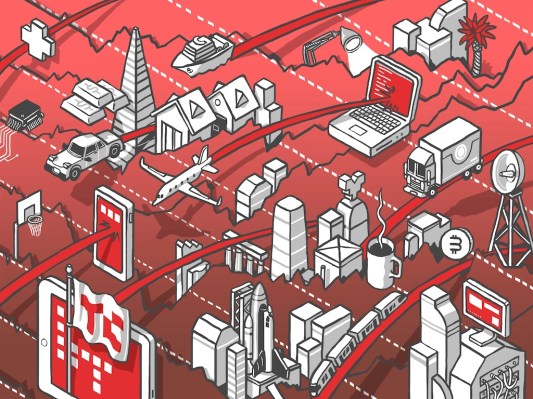Earnings season is usually a snoozer if you aren’t obsessed with the stock market. So I understand if the last thing you want to read about this morning is a meta-analysis of cross-sector earnings. But hear me out.
TechCrunch has tracked a select handful of earnings reports from major technology companies in the current Q4 2021 reporting cycle. The picture that emerges is one of companies boosted by the pandemic coming back to Earth, while companies that faced a drop in demand due to COVID-19 are on the bounce.
The Exchange explores startups, markets and money.
Read it every morning on TechCrunch+ or get The Exchange newsletter every Saturday.
The latest corporate results are telling us that the pandemic is over, from a business perspective. This is critical for startups to understand.
Roblox shares are down today, as are Shopify’s. But Airbnb and Uber and Lyft are doing better than you might have expected.
 What’s losing favor? Software, video and audio streaming, trading services, e-commerce, consumer fintech, gaming and, in some cases, social networking. And on the previously losing but now winning side, we have lodging and travel to start. The market has inverted, and startups need to prep for a re-inverted world.
What’s losing favor? Software, video and audio streaming, trading services, e-commerce, consumer fintech, gaming and, in some cases, social networking. And on the previously losing but now winning side, we have lodging and travel to start. The market has inverted, and startups need to prep for a re-inverted world.
So let’s talk accelerated and decelerated startup sectors in light of what we’ve learned from Big Tech’s flashing warning and jackpot lights.
Down is up, up is down
It was December when TechCrunch began to ring the alarm that software stocks, among the largest beneficiaries of pandemic tailwinds in terms of market demand and investor favor, were in decline. The selloff persisted into the new year. We should have read more into the early signal that public-market investors were sending.
In late January, Peloton’s CEO came under fire from external investors, a saga that we now know the ending to, but remains illustrative. Software valuations? In decline. At-home exercise equipment? Also in decline.
Then Netflix reported earnings that made investors drop its stock like a scalding pot handle. Robinhood then ate its own shirt later in January, putting a neat cap on a somewhat messy month. Consumer video streaming? In decline. Consumer trading? Also in decline.
From there the news just got worse, with Facebook, Spotify and PayPal’s stocks taking blows in early February. Why did they suffer? It varied, but Facebook’s rising costs and slowing user growth were unwelcome; Spotify projected slower-than-anticipated user growth; PayPal projected deceleration in growth.
Adding to our list of sectors in decline, we can add social networking, consumer audio and consumer fintech. The list was getting longer! We’ve seen recently public food-delivery companies suffer, losing value both in the United States and abroad. And this morning, shares of Roblox and Shopify are lower in the wake of their earnings reports. That puts consumer gaming and e-commerce onto our list as well.
This brings us to the good news: Companies that got hit by the pandemic are rebounding. The latest example of this was Airbnb’s earnings from last night. No, they were not perfect. But they were pretty darn good. Uber and Lyft were the same, posting imperfect but dramatically improved results.
In another sign of the changing times, Wag is going public on the back of a pandemic recovery. If dog-walking services are going public, people are out their damn houses, which means the pandemic days are pretty much over from a business perspective. For startups, I think the new landscape is pretty simple:
- Abnormally negative business conditions during COVID are moderating, so anticipate recovering demand and increased pricing power.
- Abnormally positive business conditions during COVID are moderating, so expect slowing demand growth and falling pricing power.
- The above two conditions will work to invert investor interest and conviction: If you had a warm market for investment in the last two years, expect it to deteriorate. If you were out of favor during COVID-19 and survived? Congrats! It’s your moment.
I write all the above while being fully cognizant that many of us have lost loved ones or are still stuck at home for whatever reason. But we’re not making a moral point or arguing any particular side of pandemic response. Instead, we’re trying to describe a changing business market. So we get to stay impersonal.
Good luck, startups. May the odds be ever in your favor.
